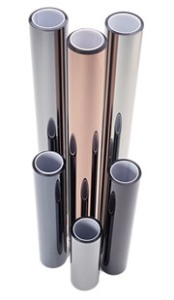Bekaert Specialty Films today announced its Solar Gard® architectural solar control window films significantly reduce greenhouse gas (GHG) emissions, and subsequently the carbon footprint, of most commercial and residential properties that use air conditioning.
 Solar Gard Architectural Soalr Control Window Films
Solar Gard Architectural Soalr Control Window Films
They are the first building improvement products made in the U.S. to measure and report their carbon footprint.1 By reducing the amount of energy used to cool commercial and residential properties, Solar Gard window films help decrease carbon dioxide levels in the atmosphere and achieve zero energy building goals.
Solar Gard window films are carbon negative in the UK, which just last month became the first European country to legislate on carbon reductions with its CRC (Carbon Reduction Commitment) Energy Efficiency Scheme. On average, Solar Gard window films are carbon neutral within one year of installation. More efficient at rejecting solar heat than low-e coatings on glazing, Solar Gard window films are both carbon-effective and cost-effective, reducing a building’s carbon footprint more effectively and for less money than new windows. In fact:
- One square meter of a low-e wood window, the type with the smallest carbon footprint, has a carbon cost of 253 kilograms. The carbon cost of Solar Gard window film is less than one kilogram per square meter.2
- Solar Gard window film saves 1001 times more GHG emissions from entering the atmosphere than is used and/or created during its manufacture.3
- Solar Gard window film installed globally between 2007 and 2008 saved 3.6 million tons of CO2 from entering the atmosphere; this is equivalent to the carbon output of approximately 30,000 British families (with four people) during the same period.4
Solar Gard’s impact on the reduction of global carbon emissions is enormous because heating and cooling systems in buildings produce significant levels of GHG emissions.5 Improved fenestration can lower energy consumption and GHG emissions by 10-40 percent in both commercial buildings and homes6, and an installation of Solar Gard window film transforms standard glass into high performance windows.
End to Greenwashing
Many companies claim to save energy and reduce GHG emissions without factoring in the environmental cost of their raw materials, manufacturing process, distribution, disposal and recycling. A complete lifecycle analysis is a required component of a Climate Declaration, and for Solar Gard architectural films it meant that the total carbon impact of the films on the environment could be measured.
“We believe companies shouldn’t claim to be green while hiding how their products are made. They’re simply greenwashing customers if they do. Customers deserve to know the real environmental impact of the products they buy,” said Christophe Fremont, president of Bekaert Specialty Films, manufacturer of Solar Gard window films. “If a product claims to save energy then it should be mandatory that they publish the full impact the total life cycle of the product has on the environment, and consumers should demand to see this information.”